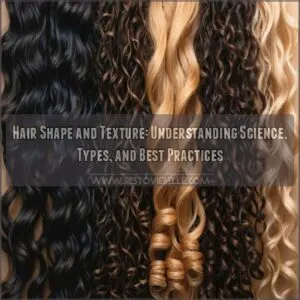This site is supported by our readers. We may earn a commission, at no cost to you, if you purchase through links.
 Discover the science behind hair shape and texture, and learn how to embrace your unique strands.
Discover the science behind hair shape and texture, and learn how to embrace your unique strands.
From understanding curl patterns to finding the best practices for your specific hair type, this article will empower you with knowledge and tips for maintaining healthy, beautiful locks.
Whether you have naturally curly hair or chemically treated tresses, dive into the world of hair structure to unlock a new level of confidence in your personal style.
Get ready to transform your mane!
Table Of Contents
Key Takeaways
- Hair texture is primarily determined by genetic factors and the structure of hair follicles.
- The chemical composition of hair, including bonds and hydration levels, plays a role in determining texture.
- External influences, such as the angle of follicle growth and heat exposure, can impact hair shape and texture.
- Proper product usage, damage prevention, and care techniques are important for maintaining healthy hair shape and texture.
Who is the Target Audience – All Hair Types? Naturally Curly Hair? Chemically Treated Hair?
If you have any type of hair, whether it’s naturally curly or chemically treated, this article is for you. As someone with extensive training and expertise in hair, I understand the importance of studying and understanding hair structure, shape, texture, and growth. Working hands-on with all hair types regularly has allowed me to witness the impact that different textures can have on a person’s personality, culture identity,and beauty. Your unique hair texture speaks volumes about your self-expression and individuality. Whether you embrace your natural curls or enhance them through chemical treatments,hair care becomes essential in maintaining healthy locks that reflect your true essence. With the right products tailored to your specific needs,you can nourish and style your tresses while embracing their natural beauty. Regardless of how you choose to wear your mane,the goal is always to empower each individual by celebrating their distinctiveness through diverse hairstyles. ## What Specific Aspects of Hair Shape and Texture Do You Intend to Cover Beyond Curl Patterns and Texture Identification? For Example, the Science Behind What Determines Shape/texture, Best Practices for Various Hair Types, Damage Prevention, Etc
Now let’s delve deeper into the science behind hair shape and texture, exploring factors beyond curl patterns and texture identification that determine the unique characteristics of your hair. Understanding these aspects will help you better care for your specific hair type. One important factor is the structure of your hair follicle, which is determined by genetics. The angle at which the follicle grows out of your scalp also plays a role in shaping your strands. Additionally, the chemical makeup of your hair shaft affects its texture; specifically, hydrogen bonds contribute to wavy or curly patterns while disulfide bonds give strength and stability to coarser textures like kinky or tightly curled styles. To maintain healthy locks regardless of their shape or texture, it’s crucial to follow best practices suited for each different type: – From using appropriate products based on hydration needs (such as moisturizing shampoos/conditioners),
- Avoiding heat damage (by limiting exposure),
- Reducing manipulation during styling routines – all tailored towards preventing breakage/damage caused by regular wear-and-tear.
By understanding these scientific aspects and implementing proper techniques catered toward individual needs – whether you have straight tresses with a subtle wave pattern or tight coils – you can achieve healthier-looking locks that radiate beauty and vitality. ## FAQs
How can I prevent damage to my hair regardless of its shape or texture?
To prevent damage to your hair, regardless of its shape or texture: – Use heat protectant products before styling.
- Avoid excessive heat and chemical treatments.
- Regularly trim split ends and deep condition to keep your hair healthy and nourished.
What are some common misconceptions about hair shape and texture?
Common misconceptions about hair shape and texture are that it’s: – Solely determined by genetics
- Unchangeable
- An indicator of health
However, hair texture can change temporarily or permanently due to various factors. ### Are there any natural remedies or treatments that can improve the overall health and appearance of different hair types?
To improve the health and appearance of your hair, try natural remedies like: – Using aloe vera or coconut oil as deep conditioners.
- Regular trims.
- Avoiding heat styling tools.
Can changes in diet or lifestyle affect the shape and texture of my hair?
Changes in diet and lifestyle can indeed affect the shape and texture of your hair. Proper nutrition, hydration, and overall well-being play a significant role in maintaining healthy hair. ### Are there any specific hair care routines or techniques that can enhance the natural shape and texture of my hair?
Enhancing the natural shape and texture of your hair is possible with tailored care routines. Did you know that regular deep conditioning treatments can increase moisture retention, resulting in softer, more defined curls? ## Conclusion
To truly embrace your unique hair shape and texture, it’s essential to understand the science behind it. By exploring the factors that determine hair shape and texture, such as curl patterns and texture identification, you can gain valuable insight into the best practices for your specific hair type. With this knowledge, you can effectively maintain healthy and beautiful locks, whether you have naturally curly hair or chemically treated tresses. So, dive into the world of hair structure and unlock a new level of confidence in your personal style.
[/zonFAQ]





